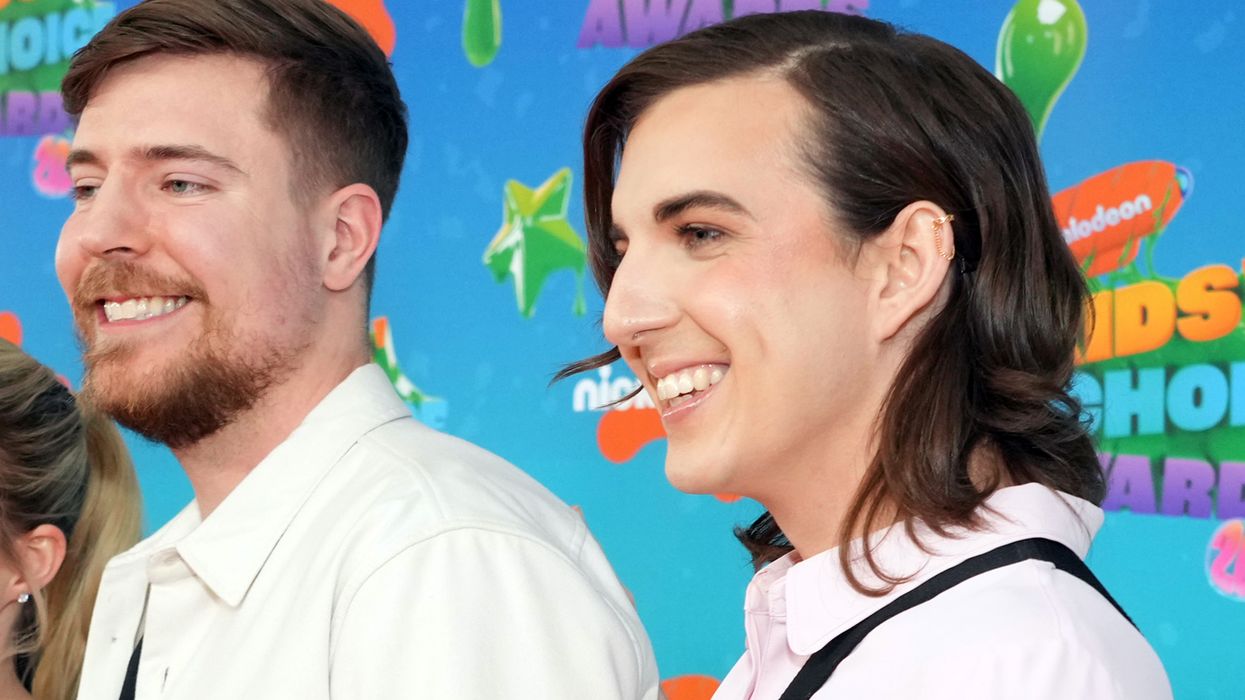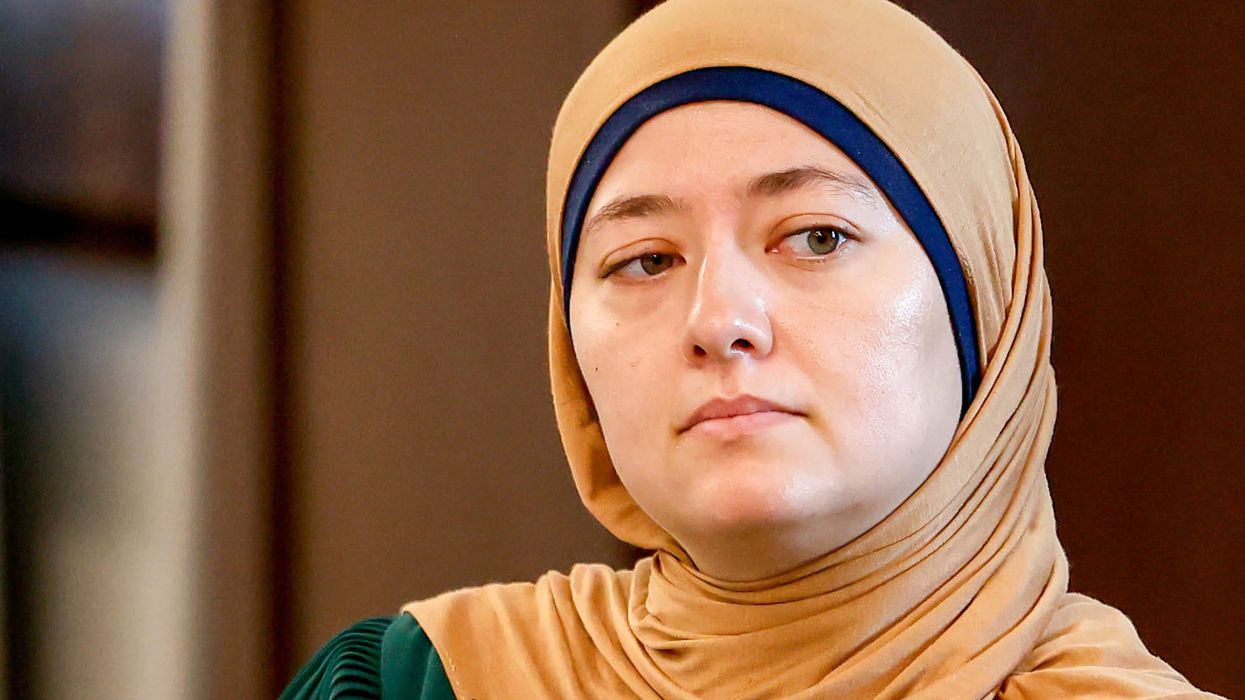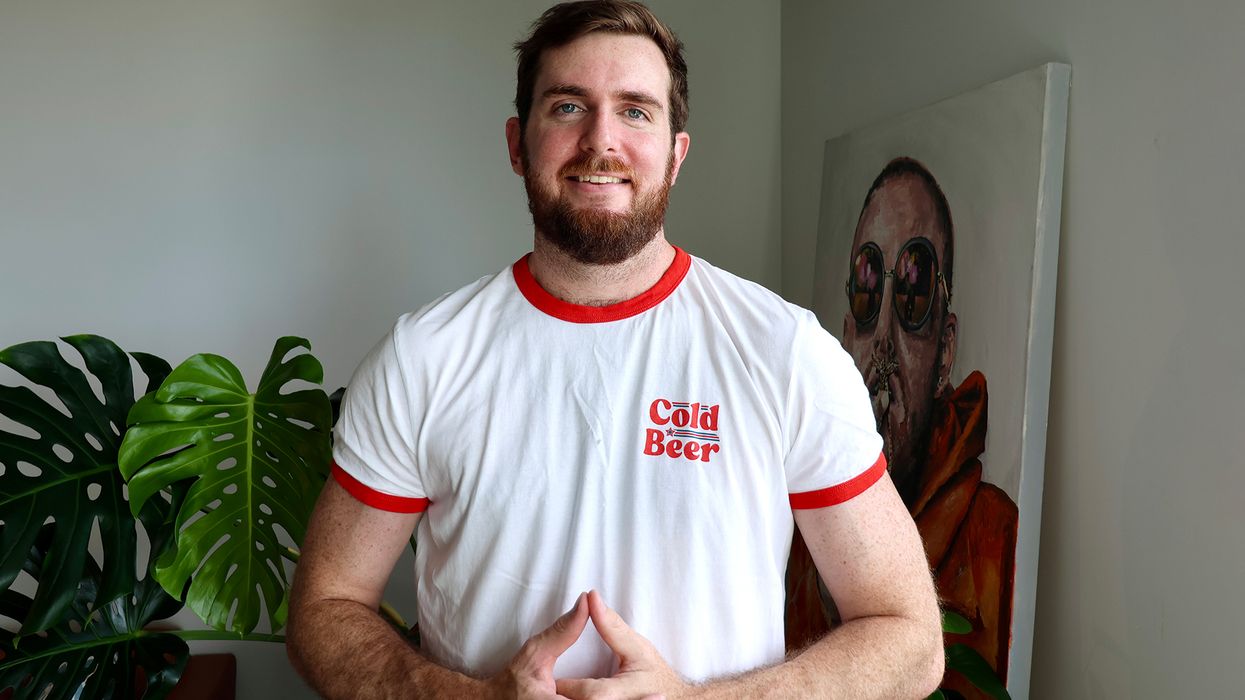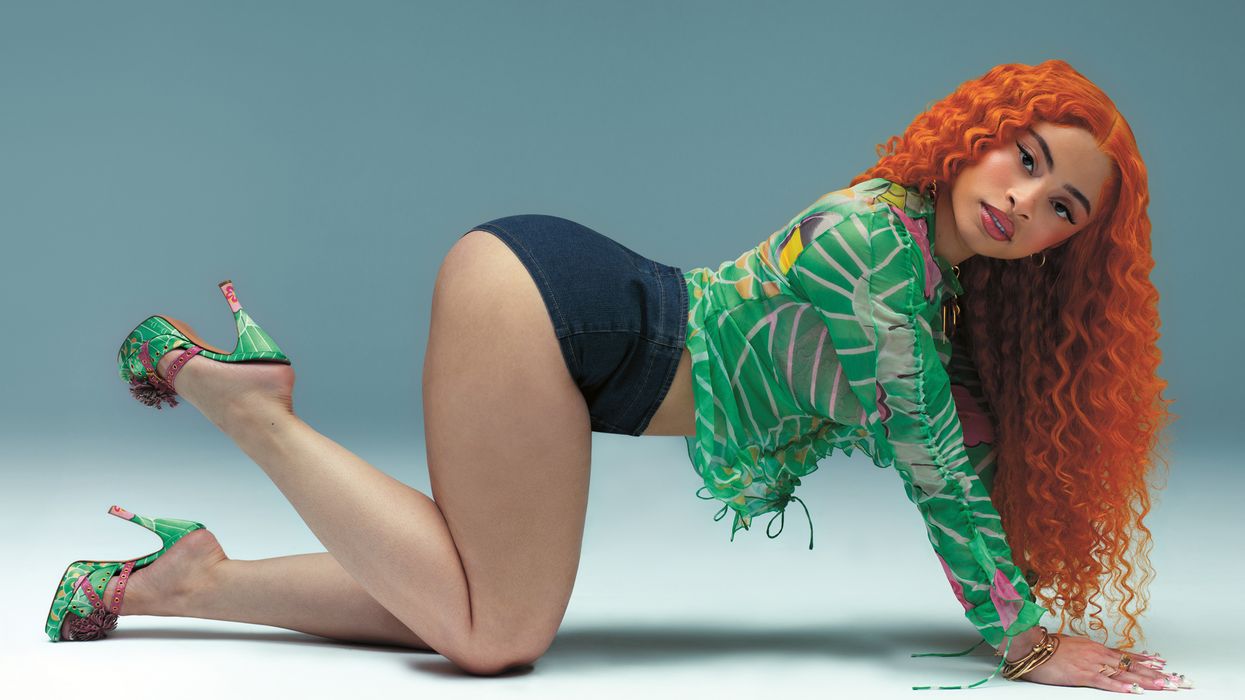Trisha Paytas is telling me about the last time she got yelled at on the internet.
It was after a Halloween episode of her podcast, Just Trish, in which the influencer and YouTuber dressed as her then-obsession, the Weeknd in the HBO series The Idol. Wearing pale-pink hospital scrubs, a fake soul patch, and a do-rag, Paytas argued to her co-host, Oscar Gracey, that being a “full-time stay-at-home parent is 10 times harder than someone who can leave.” She referred to the nonparenting labor of working moms as “a break.” The backlash was vicious.
“People were like, ‘Well, I would love to be a stay-at-home mom, plus I work 12 hours a day being a nurse, then I have to go home,’ ” Paytas says as we sit at her dining-room table in her expansive Conejo Valley, California, mansion, her one-year-old daughter, Malibu, babbling in the next room over. The floor is littered with the general detritus of parenting — diaper boxes, unopened Amazon packages, tiny hot-pink Crocs. A few hours earlier, I’d watched a TikTok of her in full Mob-wife regalia, her blond hair in a Carmela Soprano updo and her lips perfectly lined, but today she’s in leggings and a long-sleeve white T-shirt, which stretches over her five-months pregnant belly.
“I wasn’t trying to take away from working moms, because I’m a working mom,” she says. “I was just trying to defend stay-at-home moms because to be with your child 24 hours a day would be really, really hard.” At first, I emphatically agree with this statement (as a mother myself, I know it to be objectively true). But the more I think about it, the more Paytas’ explanation strikes me as less than plausible. Anyone who has spent more than two seconds on the internet knows that delving into the working-versus-stay-at-home mom debate is one of the most surefire ways to get canceled, and that’s not even to mention the fact that Paytas, a white woman, made this comment while dressed as the Weeknd. A few years ago, she would have likely doubled down, making a half-dozen follow-up videos while alienating a few more demographics for good measure. This time, however, she did something truly shocking: She conceded she had been wrong.
“Truly, cancellations always teach you something,” she explains. “You’re always like, ‘What did I do that was wrong or fucked up?’ So I’ve been thankful.”
It’s hard to overstate just how weird it is to hear this from Trisha Paytas.
For more than 15 years, Paytas, 35, has established a brand as one of the most divisive trolls in YouTube history, building a career off her blond-bimbo persona, her high-profile relationships with tabloid fixtures, and beefs with former friends like Shane Dawson and Jeffree Starr. Above all else, however, it’s been Paytas’ willingness to say and do virtually anything for views that has led to her being canceled more times than streamers have axed minor superhero franchises. Her controversies are as multitudinous as there are stars in the sky: She has been canceled for coming out as transgender (she is not), for rapping the n-word, for adopting an Asian accent to announce a new J-pop-star persona, for jokingly self-identifying as a chicken nugget. She skewered her own capacity to infuriate with a 2020 TikTok in which she dressed as Cleopatra and lip-synced to Steve Martin’s parody song “King Tut,” with the caption: “Will prob delete. Prob offensive.”
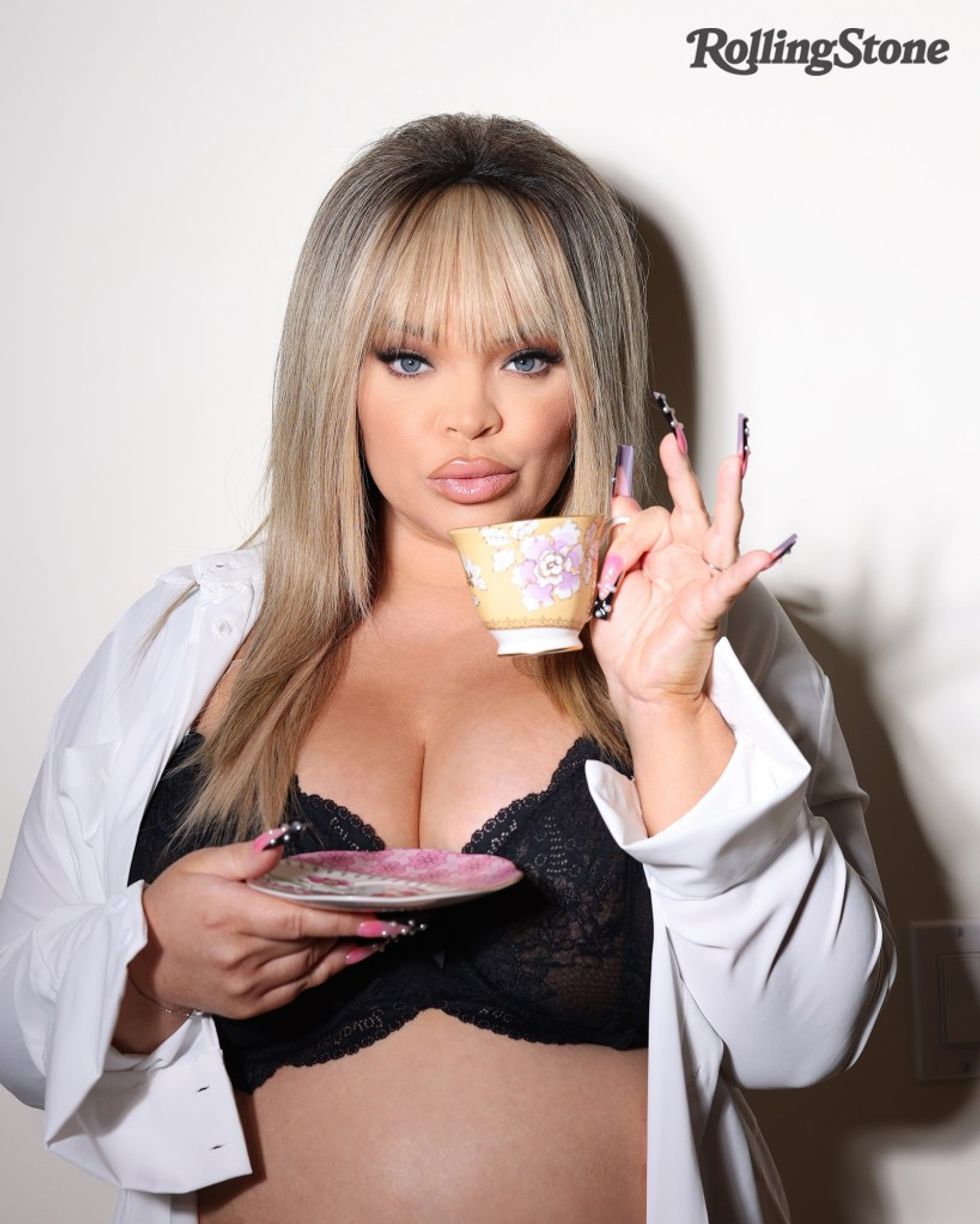

Paytas is hyperconscious of the fact that she has said and done a lot of things that have hurt people. Though she attributes some of this to her much-publicized struggles with substance abuse and mental illness — she was diagnosed with borderline personality disorder (BPD), a condition characterized by impulsivity and mood swings, in 2019 — she acknowledges that much of it stemmed from her desire to get money and attention. “I’m definitely not the person to be like, ‘I don’t know why I got canceled,’ ” she says. “I get it. I get why brands don’t want to work with me. I’ve said crazy stuff for attention, for money. I took the trolling so far.”
Within the YouTuber ecosystem, this is not unusual; what is somewhat unique, however, is how resilient Paytas has been in the face of multiple cancellations, akin to the old joke about only Cher and the cockroaches surviving a nuclear apocalypse.
Since getting sober, marrying the Israeli-born artist Moses Hacmon, and becoming a mother, Paytas has pulled off probably the most shocking move of her entire career: The people who used to follow her out of sheer morbid curiosity have become genuine fans. Her comments sections on TikTok and YouTube, which used to be replete with people imploring her to kill herself, are now filled with “Yassses” and “Mothers” and “We can’t help but stans.” Fans who have watched her over the years seem genuinely moved by her trajectory from self-described “mess” to (seemingly, at least) reformed troll.
“She knows that she’s not entitled for people to forgive her, or love her, or watch her,” says Gracey, her longtime friend and Just Trish podcast co-host. “She knows that she has to work. She really pushes herself to be open to new ideas [and] to change her opinions on things.”
There are some issues with Paytas’ redemptive arc — namely, that many other creators who are more marginalized than she, and have pissed off far fewer people, would likely not be granted as many resurrections. I also question the degree to which marriage and motherhood can really make someone a better person (other than perhaps making one more tolerant of infants on planes).
But being saved by the stability of a family is precisely how Paytas sees it. Having spent her entire life not believing she was worthy of anything more than making people mad on YouTube, being loved has given her a renewed sense of insight and purpose. “I know they say you shouldn’t change for a person or a person can’t save you, but I believe [Moses] did,” she says. “I was a mess when I met him. I drove to his house so many times high and stood naked on his porch, threatened to kill myself. I was just a really not-well person. But for some reason he just really loved me. And I just thought, ‘If this person loves me this much, I should probably try to love myself.’ ”
With social media, I’ve never been the popular girl. I’m not really an outcast. I think I’m literally the person who’s just there.
PAYTAS HAS ALWAYS been obsessed with fame. Growing up in Illinois, she fantasized about becoming a child star, like the Olsen twins in Full House; as a teenager, she transitioned to worshiping Playboy models. She loved musical theater and auditioned for her high school productions, despite having little vocal or acting talent. “I loved the attention, feeling like a star,” she says. “[But] I was always extra and background.” This is why, she says, she started doing elaborate re-creations of music videos once she became an influencer: “Because I always wanted to be the lead.”
To get attention, she would tell various lies, like that she was a twin, or engaged at 14. “I don’t know why I did it. Either to make myself more interesting, or to distract from the fact that my life wasn’t interesting,” she says. “I just wanted people to be interested in me. And it kind of manifested into actual crazy shit happening to me.”
Around 2006, Paytas moved to California to try to forge a career in entertainment. Because Paytas was blond and curvaceous, she largely booked walk-on bimbo roles. In a 2011 episode of Modern Family, she had a non-speaking part as a party guest with implants (which was ironic, she says, because she didn’t get fake breasts until the following year); and in a 2013 episode of Nathan for You, she appeared as an object of fixation for a boob-obsessed security guard.
At the time, Paytas found the objectification validating. “I’d always told myself, ‘I’ll be famous if I can only lose a few pounds,’ ” she says. “[So] I was like, ‘Wow, people want me to be a sexy person.’ ” Part of her lore is that around this time she also dabbled in sex work, starting out with being “a hooker on Santa Monica Boulevard for $5 blow jobs,” as she puts it, then dancing at strip clubs and charging $5,000 for a weekend date as an escort. Paytas has talked openly and frequently about it, and while she says she had her share of harrowing moments — “On a podcast, I said I was kidnapped [by clients] 40 times,” she says, “but it was, like, four” — she found some value in it. “To have sex with guys — which I would have done for free, for validation — to charge $5,000 for it? It just felt like, ‘Wow, I’m worth something.’ ”
Around the same time, she was dating a string of what she refers to as “D-list” celebrities, including, she claims, the Tony Award-winning actor Roger Bart, whom she classifies as her first love. “I was enamored,” she says. “I thought we were gonna get married, have babies.” She soon discovered, she says, that she had been Bart’s “side chick.” (A rep for Bart didn’t respond to Rolling Stone’s request for comment.) This was another thing she enjoyed about escorting: She felt the clients respected her more than the men she dated.
“They would offer something like, ‘Oh, you can come to this premiere with me,’ ” she says. But that “[always] fell through. So I respected the people who just paid and didn’t promise things.”
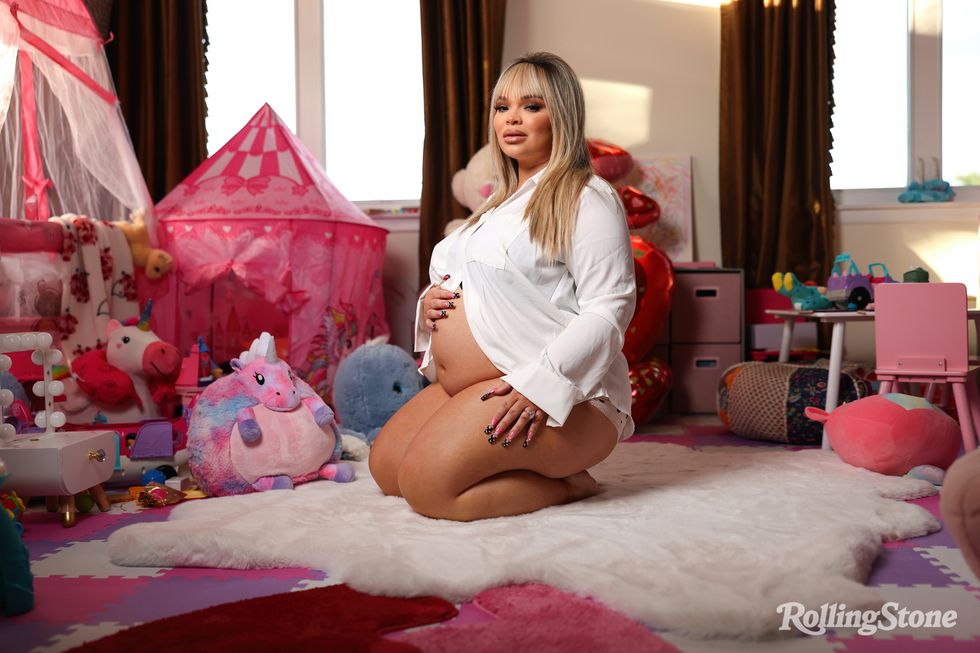
IN MANY RESPECTS, YouTube, which Paytas joined two years after its advent in 2005, was the perfect platform for people just like her: those thriving off attention, who were not quite conventionally talented enough to pursue careers in mainstream entertainment. Her early channel is a capsule of a Hollywood aspirant’s quest for fame, with her throwing things at the wall to see what sticks: In one video, she raps Vanilla Ice’s “Ice Ice Baby,” while in another, she tries out a corny routine for the NBC reality show Last Comic Standing. “With YouTube or social media, I’ve never been the popular girl,” she says. “I’m not really an outcast. I think I’m literally the person who’s just there.”
This may have been true at the start of her career, but it changed in the early 2010s, when Paytas started making content with other misfit vloggers, such as OG YouTubers Shane Dawson and Drew Monson, resulting in an explosion of views. “They all grew up with childhood trauma, feeling like they didn’t belong,” says Gracey. “But then when they got together, it’s funny — they kind of became the quote-unquote cool people on YouTube.”
At this point, Paytas had zeroed in on the secret to online attention: “Pissing people off … I wanted to be Howard Stern so bad. I wanted to be Andy Kaufman so bad,” she says. “There’s times where I truly did not mean to offend, and there’s times where I was just trying to be offensive. And I kind of just regret … all of it.”
Much of what Paytas said on camera in those early years, she says, was intended to be inflammatory, such as the time she said women should stay in the kitchen washing carrots (which she took from a Kaufman monologue), or when she questioned whether dogs had brains. At other times, she claims, she was not educated enough to understand context, like when she came out as transgender, saying she didn’t have the language at the time to refer to herself as nonbinary (for a while, she used they/them pronouns; now, she prefers she/her). On another occasion, Paytas diagnosed herself with dissociative identity disorder (DID), introducing her various “alters” and inflaming the mental-health community. “I really didn’t see anything wrong with it until I saw the internet telling me this is bad,” she says.
I always thought I was going to die young, like Anna Nicole Smith. So I’m thankful to show the journey of being unwell to being better.
Gracey says Paytas sincerely believed she suffered from DID at the time, only lapsing into trolling as a defense mechanism after getting backlash. “She was like, ‘No one’s going to take me seriously, no one believes me,’ ” he says. “And I think she got reckless.”
This has been a pattern in Paytas’ career, yielding something of a Cassandra effect: Even when she is being genuine, her propensity for trolling has led people to question her motives. “It’s hard to figure out what is authentic and what is Trisha playing a hyper-Trisha version of Trisha,” says Gracey.
That’s essentially what happened when she came out against David Dobrik, the head of the You-Tuber collective known as the Vlog Squad, after dating one of the group’s members, Jason Nash. The relationship was rocky, and the constant teasing and pranking within the group made it worse. “I don’t think I’d ever had anyone else claiming me as a girlfriend before,” she says. “But looking back, that person did not like me at all.” Nash would joke on camera about sleeping with other women and criticize Paytas’ eating habits, exacerbating her body-image issues and making her, as Gracey puts it, “question her worth.” (Nash and Dobrik didn’t respond to requests for comment.)
When the relationship ended — Paytas claims Dobrik forced Nash to dump her after she and Dobrik’s friendship soured — Paytas had a genuine mental-health emergency. She was institutionalized three times in 2019, and developed an addiction to painkillers. She also hung out with Aaron Carter, with whom, she claims, she would do drugs between hospital visits. “He was just a really nice person,” she says. “[With addicts] there’s so many struggles and so much pain, but they’re just nice people who don’t want to hurt anyone.” She says they kept in touch right up until he died in 2023, drowning while high on inhalants and generic Xanax.
Paytas’ erratic behavior during that time would be used by Vlog Squad fans as ammunition against her when she accused Dobrik and the group of exploitative behavior, in 2019. Paytas felt less than vindicated when Dobrik was later accused of facilitating unsafe work conditions in 2021. “I talked about David for so long until other people came forward,” she says. “I think I just lost credibility, and people don’t listen to what I have to say. Or they’re just like, ‘Trisha lies.’ ” (Dobrik has since apologized, telling Rolling Stone in 2021 that people getting hurt in his videos “could’ve been so avoided.”)
That same year, Paytas embarked on a turning point for her career: the podcast Frenemies, co-hosted by fellow legacy YouTuber Ethan Klein. Paytas and Klein had a contentious relationship in the past; with Frenemies, however, the two appeared to reach a detente, and it racked up millions of listeners before abruptly and somewhat mysteriously ending in 2021. Frenemies is the one topic in our nearly three-and-a-half-hour conversation that she declines to discuss, but it’s clear that the fallout still deeply wounds her. “I [don’t know what I would have done] if I did not have Moses,” she says.
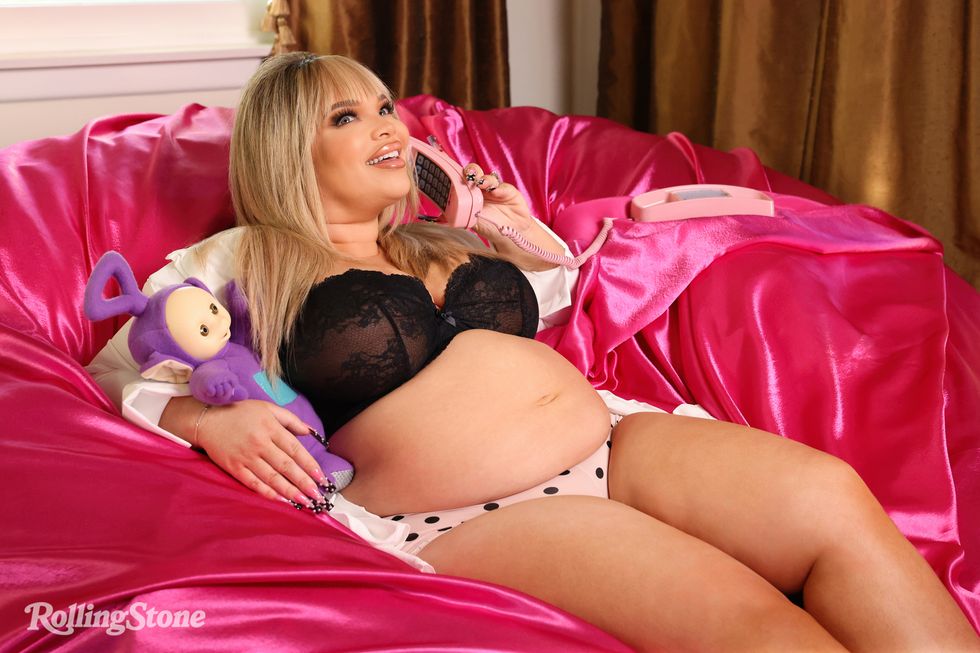
This is the one net positive that arose from Frenemies: It introduced Paytas to her husband, Moses Hacmon, whose sister Hila is married to Klein. Hacmon is a constant presence both in Paytas’ online persona — he frequently appears on her podcast and in her videos, participating in elaborate couples’ cosplays and Paytas’ trademark fast-food mukbangs — and during our interview; the whole time, he sits in the adjoining kitchen, patiently feeding Malibu.
Hacmon strikes me as highly protective of Paytas, which Gracey confirms. “She constantly lives in fear of the pendulum swinging. She always is worried about something: Like, ‘Oh, God, am I gonna get demonetized? Am I gonna be blacklisted?’ She has big fears about everything collapsing,” he says. “But he’s so calming and reassuring.” Their dynamic makes even more sense when Paytas talks about her life around the time she met Hacmon. “I was so combative. I was so defensive. I was just so unhinged,” she says. She became consumed with the fear of embarrassing him, and later, when she got pregnant, embarrassing their daughter. “I was like, I have to be able to control myself. And that I’ve never been able to do before.”
IN 2021, SHORTLY after meeting Hacmon, she got sober and started dialectical behavioral therapy (DBT), an intervention for those struggling with the mood swings and histrionic behavior that accompany BPD. “Everything that got me in trouble was just me lashing out,” she says. “I would cry hysterically online, and people wouldn’t take me seriously.” With DBT, “I learned how to be the calm one. People listen to you a little bit better.”
The public got its first glimpse of what a wiser, more mature Paytas might look like in late 2022, when she was pregnant with Malibu. After Queen Elizabeth II died, fans circulated a meme characterizing Paytas’ as-yet-unborn baby as her reincarnated spirit. Rather than lean into it by, say, cosplaying a member of the royal family, Paytas took to TikTok to tell people to, in no uncertain terms, bugger off.
“I was so out of my trolling era, and I was in such a good space spiritually,” she says. “The fact that my pregnancy got ruined by trolling — now, I guess, it’s kind of funny and karmatic. But it just made me so upset.” (Paytas didn’t entirely avoid using the birth of her first child for content, however: Not long after Malibu was born, she posted a TikTok with her, titled “ASMR Singing to my Newborn in the Hospital.”)
Paytas also had an opportunity to revert back to her old ways in mid-2023, when her friend Colleen Ballinger, best known as the YouTuber Miranda Sings, was accused of posting nudes of Paytas on a group text and mocking her. Rather than capitalize on the incident by, say, making a string of videos about a “feud,” she made one video briefly addressing the alleged texts before cutting ties with Ballinger, saying, “I really do believe in protecting my peace and happiness.” (Ballinger did not respond to a request for comment.)
While Paytas maintains that she is “held to a different cancellation standard” than others, she acknowledges she’s been fortunate to reach “a good place” in her career. “People like me for me,” she says. “I can just make money just being myself and not having to shock people.” She sees herself as a cautionary tale for creators trapped in the endless cycle of trolling for eyeballs, then asking for forgiveness.
“I always thought I was going to die young, like Anna Nicole Smith,” she says. “So I’m thankful to show the journey of being unwell to being better, because I think it is possible for people to change. And I’m happy to be that spokesperson.” I ask Paytas if she feels she’s truly grown up. “I always feel like a teen mom,” she says. “But maturity-wise, in terms of just caring about my family, where little things just don’t matter? Yes, I have.”
A few weeks later, though, I come across a post on Paytas’ X account. It’s a quote-tweet announcing an upcoming K-drama on Netflix, about a girl who turns into a chicken nugget. “Where’s my royalty check?” she wrote, including a screen grab from the infamous video where she self-identified as a chicken nugget.
So maybe the impulse to troll never quite dies — or, at the very least, can’t be extinguished by anything as quotidian as marriage or motherhood. But I am fairly certain that if ever there is a nuclear apocalypse in L.A., the one thing we’ll see before losing internet access is Trisha Paytas posting about it. Whatever she posts will prob be offensive. But she can always delete later.
Production Credits
Hair by TONY IBARRA. Makeup by ARIANNA GARCIA. Outfits by FASHION NOVA. Photographic assistance by NINA ROCIO







